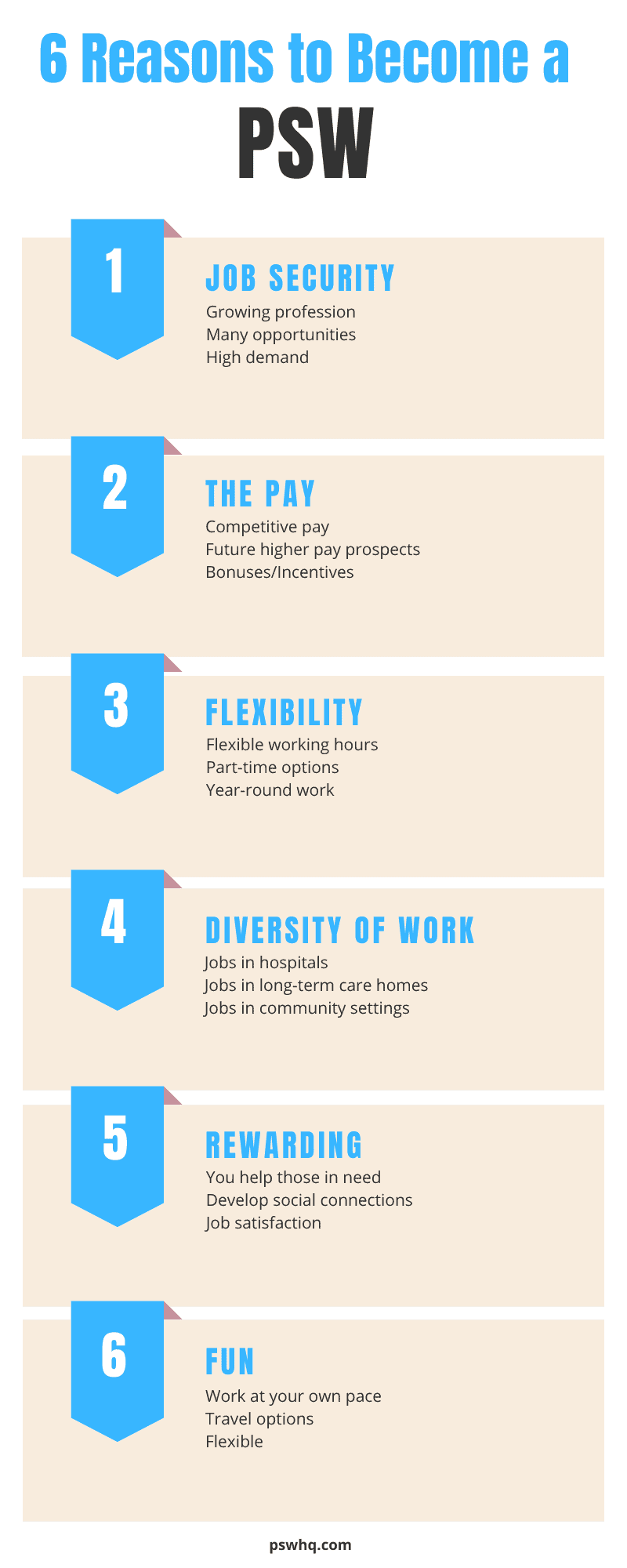
There are several reasons why working as a Personal Support Worker is amazing, but becoming a professional personal support worker is not easy.
Only the strong stay in the profession.
There are approximately 100,000 personal support workers in Ontario.
According to a recent survey, 62% of graduates from the Personal Support Worker programs in Ontario end up leaving the profession and 25% of them leave within the first 2 years.
So, for those of you who want to understand why that 38% stayed and love what they do every day, and maybe want to become one of them, here are six reasons to become a Personal support worker, though you should be aware of potential PSW problems, too.

1. Job Security
This job isn’t going anywhere, and it never will.
Personal support workers are the largest group of healthcare employees in the long-term care sector. There are also various bridge programs available at several institutions in Ontario to help you make the move from personal support worker to RN or RPN.
There are approximately 58,000 personal support workers working in the LTC sector in Ontario.
And the demand for personal support workers in this sector and other settings such as hospitals and communities is at an all-time high.
As a personal support worker, you have a job for life.
There will always be elderly and sick people in this world who need your help.
Now, that’s not to say you’ll always have full-time employment in facilities because, more often than not, you’ll start part-time or casual.
However, the profession will always be there.
It will grow.
More LTC homes will open and more jobs will be created.
Always always keep your eyes open to opportunities.
This brings me to my next point:
2. The Pay
To start off, we all agree that the hourly wages of Personal Support Workers in not what they really should be.
Current wages do not reflect the hard work you do!
However,
there are many reasons behind it.
All along, Governments at various levels have never recognized PSWs as integral members of the healthcare delivery system.
But the COVID-19 pandemic had changed that perception.
The Government has finally realized the critical role of PSWs.
There is no going forward without your help.
There are Government plans to enhance the wages of PSWs and we hope those plans materialize soon.
Going forward, it is a great profession to be in with strong future job prospects including better hourly wages and stable working hours.
3. Flexibility
This is a 24/7 and 365-day-a-year job.
It doesn’t stop because it’s Friday, or because you have a dentist appointment at 2:30 PM on a Wednesday.
If those days or times don’t work for you, then I have no doubt that you can pick up a shift that does work.
Keep in mind, though, that the more shifts you are able to pick up the more seniority you’ll have.
The work is out there, but you have to go get it.
If you decide to work with an agency, you can more or less make your own schedule.
This is a great second job to have on top of working elsewhere for extra hours.
4. Diversity of Work
You don’t want to work in a long-term care home?
That’s not a problem.
You can work in the community?
You don’t want to work in the community?
That’s not a problem.
You can work in a private setting.
You don’t want to work in a private setting?
No problem.
You can work in a hospital.
There are many options for you to work as a Personal Support Worker.
Hospitals are starting to utilize more and more PSWs.
PSWs work in many inpatient care areas, even the Intensive Care Unit (ICU) and Critical Care Units (CCU).
You have many options.
Pick one. Pick two!
5. Emotionally Rewarding
If you have decided to become a Personal Support Worker, there is one for sure:
You love to help people.
Why else would you become a personal support worker (besides all of the reasons above!)?
And why do you love to help others, other than the fact that you’re simply a great personality?
Because it feels good.
No, it feels GREAT.
If you’re having a bad day and you walk into work, I guarantee someone will cheer you up very quickly.
The emotional benefits of being a personal support worker, far outweigh any negativity that you may come across.
When you work with co-workers who appreciate you, in a friendly, home-like environment, you can’t help but feel good about what they do.
6. It’s Fun!
This job is so. Much. FUN!
If it wasn’t, many people wouldn’t put in the effort to talk about it ad nauseam with everyone that they know.
When working with seniors you’ll hear tons of stories.
You’ll probably get hit on by some flirtatious gentlemen (or ladies!).
And, to round out the day, you’ll no doubt run into some cursing from someone almost 3 times your age.
While this is hilarious in and of itself, the facilities also show their love for PSWs by throwing parties and getting together.
Everyone likes a party, right?
In addition, if you choose to work in private care settings such as in the community, you are not confined to working in one place.
Seniors and people in need of help are everywhere, so PSWs are needed everywhere too.
When working with an agency, you end up working in homes, nursing homes, and retirement homes for private care.
Also, take into consideration the potential for leaving the big city.
Not a lot of people want to work way up north in the middle of nowhere, but some do.
Being a Personal Support Worker, you can work just about anywhere.
The Final Verdict
This is why 38% of you will continue to provide great services for a long time.
These are the reasons that great PSWs thrive on, what keeps them going in this fantastic, emotionally rewarding, endless opportunity line of work.
Always keep your eyes and ears open to opportunities.
Talk to people.
Anyone, everyone, even if they’re not in healthcare.
Be proud of this growing profession, your growing profession.
To be a personal support worker is to not only be a healthcare worker but a good friend.
You’re kind, patient, and caring.
The PSW profession is fantastic,
and
You’re the reason why!
FAQs
1. What do you enjoy most about the PSW job?
The work PSWs do is appreciated by their family and clients, who really appreciate what they do. They enjoy making their clients smile and feeling cared for as much as they enjoy brightening their days. That’s the essence of becoming a personal support worker.
2. What are the question for PSW interview?
The questions for a PSW interview can vary depending on the hiring organization, but often includes questions about your experience, skills, and what you can bring to the role. You may also be asked behavioral questions to assess how you would handle certain situations in a care setting. Be prepared to answer questions thoroughly and honestly.
3. What are the top 5 things that make a good support worker?
Some of the most important characteristics of a good support worker include:
- Patience – A good support worker is patient and can handle difficult situations.
- Compassion – They must be able to feel compassion for their clients and understand their situation.
- Communication Skills – They must be able to communicate effectively with their clients and other professionals.
- Organized – They must be able to keep track of their client’s files and appointments.
- Dependable – They should be reliable and able to handle stress well.
4. What are the roles and responsibilities of personal support providers and workers in aged care?
Personal support providers and workers in aged care have a variety of roles and responsibilities, including providing personal care, assisting with activities of daily living, providing social and recreational activities, and helping to maintain the safety and well-being of residents. They also may be responsible for meal preparation, housekeeping, and other tasks as needed.
5. How can you safely prepare for tasks when providing personal support?
When providing personal support, it is important to safely prepare for the task at hand. This can be done by ensuring that all necessary supplies are gathered and that the work area is clear and organized. Additionally, it is important to take into account the individual’s abilities and limitations when preparing for a task. For example, if the person has difficulty standing for long periods of time, then tasks that require standing should be avoided.
[wp-post-author]









These ideas are the best ideas .
Arvinder, glad you liked the article.
Do let us know if you would like information on any other topic related to PSWs.